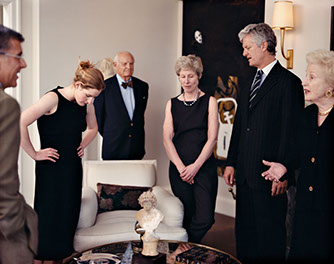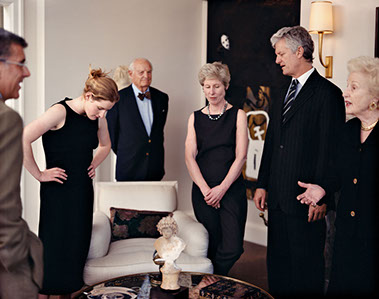"WHEN PEOPLE THINK OF CLASS THEY AUTOMATICALLY THINK OF MONEY."
Classless Society Stories Project
back to top
I'm not sure how old I was before I knew that you could buy brand-new furniture from a store, that there were things like furniture stores. When I was growing up, my mother got furniture in three ways. She would take things off the street; she would buy them in junk or antique stores; and she would find furniture at the dump. How many people on this campus had parents who would go scavenging in the town dump for furniture?
Classless Society Stories Project
The closest most folks come to talking about class in this nation is to talk about money. For so long everyone has wanted to hold on to the belief that the United States is a class-free society - that anyone who works hard enough can make it to the top. Few people stop to think that in a class-free society there would be no top.
bell hooks, Where We Stand: Class Matters (New York: Routledge, 2000), 5.
"Successful people want to be with other successful people." Kitredge said. "Birds of a feather," he added. "On Nantucket you don't feel bad because you want a nice bottle of wine. If you order a three-hundred-dollar bottle in a restaurant, the guy at the next table is ordering a four-hundred-dollar bottle."
Geraldine Fabrikant, "Old Nantucket Warily Meets The New," in Class Matters, ed. Bill Keller (New York: Times Books, 2005), 168.
I'M NOT SURE HOW OLD I WAS BEFORE I KNEW THAT YOU COULD BUY BRAND-NEW FURNITURE FROM A STORE, THAT THERE WERE THINGS LIKE FURNITURE STORES...
CLICK TO READ
THE CLOSEST MOST FOLKS COME TO TALKING ABOUT CLASS IN THIS NATION IS TO TALK ABOUT MONEY...
CLICK TO READ
SUCCESSFUL PEOPLE WANT TO BE WITH OTHER SUCCESSFUL PEOPLE...
CLICK TO READ
THE FIRST TIME I BECAME AWARE OF MY OWN CLASS STATUS, I HAD JUST MOVED BACK TO THE STATES...
(0:53 min)
CLICK TO PLAY AUDIO
CLICK TO PLAY AUDIO
CLICK TO PLAY AUDIO
THERE'S NO WAY FOR ANYONE TO UNDERSTAND WHAT IT'S LIKE TO NOT HAVE ENOUGH MONEY...
(1:10 min)
WE WERE VERY UNHAPPY WITH THE INCREASING DISPARITY
OF WEALTH
IN SARATOGA...
(1:59 min)
back to top
-
DEFINING WEALTH
Wealth is not easy to define. In economics, however, it means the total dollar value of all one's assets, which fall into two broad categories: tangible assets and financial assets. Tangible assets typically denote primary residence, rental property, and other real estate, while financial assets are claims that entitle the owner to future income, which might include bank savings, stocks and mutual funds, and IRA, Keogh, and 401(k) retirement accounts. For borrowers, debt signifies a negative asset, an income payable in the future to the borrower. Total net worth, therefore, means the total value of one's assets less total debt.
Wealth differs from income. Income is the variable flow of money receipts to a person over a certain period of time, while wealth is a variable, the dollar value of the assets accumulated over time. Income can increase wealth through savings, while wealth can contribute to income through the sale of assets. Liquidity of assets refers to the ease with which assets can be converted into cash, a stock counting as a more liquid asset than a house. Wealth therefore provides financial security and economic stability, like a safety net in times of need.
-
UNEQUAL DISTRIBUTION
The distribution of wealth in the United States is highly unequal. In 2010, the most recent year with data available, the top 20 percent of households owned 88.9 percent of total net worth, with the remaining 80 percent owning only 11.1 percent. The concentration of wealth is more extreme for the distribution of financial wealth, as shown in the data section. The wealthy are more likely to hold high-paying jobs and save more, adding to their wealth, and in an economic downturn, the safety net that wealth provides protects them. Wealth concentration continues to rise as average citizens get hit disproportionately more by economic downturns. In other words, wealth breeds more wealth.
Concentrating wealth in the hands of few, as with income concentration, leads to intensified decision-making power, through which the wealthy perpetuate their own interests. As the biblical proverb observes, "The wealth of the rich is their fortified city, but poverty is the ruin of the poor."


